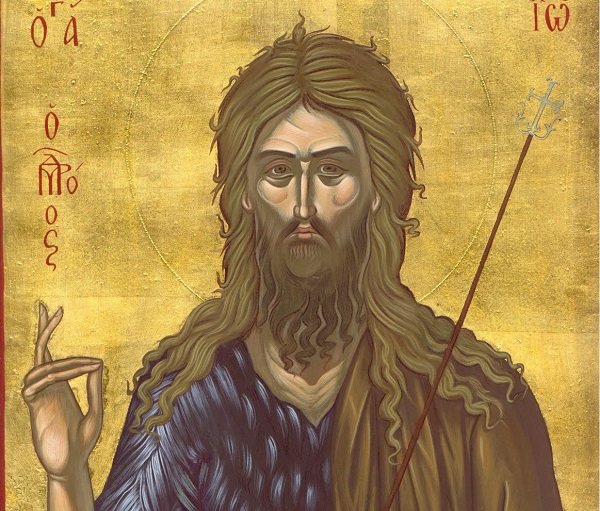
The Church gives particular honor to St. John, the most righteous Forerunner and Baptist (after the All-Holy Theotokos). In fact, if we look at the iconostasis, we can see his icon placed next to the Lord’s. The Lord honored him in a special way, with the greatest declaration possible for a human being: “Assuredly, I say to you, among those born of women there has not risen one greater than John the Baptist” (Matthew 11:11). God had given him the mission to preach repentance among the people, and to baptize the repentant in the Jordan River. There, in the desert of the Jordan, John lived a strict life of asceticism, “clothed with camel’s hair and with a leather belt around his waist, and he ate locusts and wild honey” (Mark 1:6). We are amazed by his austere way of life, for which he was called “an angel on earth and a heavenly man”!
There are Christians who, upon hearing about the asceticism of John the Baptist and others in the following centuries (even in our times), ask the question: Why such poverty and hardship? Why do they subject themselves to such strict living?
This is a very important question that concerns all of us. In order to understand, let us go back to the beginning, to the first-created Adam and Eve. The Creator created them “in the image of God” (Genesis 1:27) and gave them the ability to freely decide whether or not they would remain in communion with Him and become, by grace “according to the likeness of God” (Genesis 1:26). If they had used their freedom in the right way, they would have achieved immortality, firmly remaining good and enjoying the blessings of paradise. But, as we know, they were deceived by the devil, choosing to believe his lies. They wanted to become gods by their own efforts and with ease, showing the desire to eat the fruit that had been forbidden them. In other words, all three energies of their soul (mind, will and desire) were firmly set against God, with the deadly consequence of sin consuming the human race, with all of the suffering which we know.
With Holy Baptism, Our Lord Jesus Christ forgives us and sets us free from the bondage of this original sin. However, to be healed and brought to the spiritually healthy state which the first-created possessed, we must do our part. There has to be co-operation with God (“synergy”). What this means, is that while our Lord and Savior Jesus Christ has healed us from the cause of this spiritual illness, the weakness and inclination towards evil that is a consequence remains within us. That is why we are required to make the effort towards recovering our strength and fully regain spiritual health. This can be seen in the physical body as well. For example, someone has cancer, and with surgery and treatment, they are able to get rid of the malignant tumor. This is not the end, as a person has to continue to be treated with medicine, a proper diet and the necessary physical exercises. It is only with these efforts that their health can be stabilized and a full recovery possible.
This is the exact purpose of spiritual exercises for the Christian: To achieve this “stabilization” of their spiritual well-being, and to protect it from the disease of the soul (Sin). Sufficiently strengthened in this way, the soul can steadily move towards its final destination, the heavenly Paradise (that which was lost by the first-created). Here, they will live in eternal communion with God.
It is this good struggle that our Lord first encouraged us: “Strive to enter through the narrow gate” (Luke 13:24). St. Paul the Apostle exhorted his disciple Timothy (and each one of us) to “Fight the good fight of faith, and lay hold on eternal life” (1 Timothy 6:12). The same Apostle also, in order to strengthen us in this fight, writes: “I have fought the good fight, I have finished the race, I have kept the faith” (2 Timothy 4:7). We all know of St. Paul’s struggles throughout his entire life, as well as a whole army of spiritual fighters who came after him.
At this point it is necessary to make a clarification. Not everyone will achieve the same results. Not every athlete ends up going to the Olympics, and for those who do go, not all receive gold medals. For each, it depends upon their abilities, the quality of their coaching and the consistency of their training. This is also the case in the spiritual struggle. Not everyone will be like St. Anthony or St. Alypius, who lived on a column for decades. Most people will not reach the heights of St. Seraphim of Sarov, who prayed for a thousand nights on top of a rock. All of them received special gifts from God.
There is a key difference here to note between ascetics and athletes: All those who engage in the spiritual struggle towards God are blessed by Him and rewarded (which is not the case with athletes competing for the Olympics). These gifts are different for each person, like the differences between the glory of the stars, as St. Paul the Apostle writes (see 1 Corinthians 15:41).
All of us are called to embrace the ascetic spirit of our Saints, as much as we can, taking into account our life circumstances and spiritual strength.
The question that then arises is this: How can a Christian do this and with what spiritual powers? Due to lack of time, we will try to answer in our next homily.





